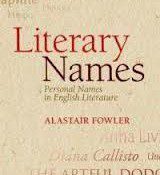
Literary Names:
Personal Names in English Literature
By Alastair Fowler
Oxford University Press
“A rose by any other name would smell as sweet” is one of Shakespeare’s most-quoted lines. But if we pursue the word etymologically — rose comes from the Latin word “rosa,” probably via Italian and Greek dialects, from the Greek word rhodon, and ultimately from the Persian word “vrda” — would we be forced to reconsider Shakespeare’s wisdom? According to Alastair Fowler’s book, Literary Names, we would, because our impression of the rose, and everything else, depends a great deal on its name. An afficianado of onomastics, or the study of names, Fowler has written an erudite book on names in literature, Literary Names: Personal Names in English Literature. It makes for intriguing, though dense, reading.
Fowler gives numerous examples of writers fretting over names for their characters before they arrive at what they believe is the best possibility. In so doing, Fowler discredits critics who treat character names as arbitrary, and illustrates his theory by tracing a sort of genealogy of character names through Homer, Spenser, Shakespeare, Milton, Thackeray, Dickens, Joyce, Nabokov, and others.
In Fowler’s view, Shakespeare is rather undemanding and blatant in his choice of names compared to Spenser, who was brilliant in this regard. Spenser believed that for a literary name to be successful, it had to include at least three elements: 1) English, Latin or Greek, 2) a romance association, often in an Italianate spelling, 3) further wordplay, contributing supplementary meanings. Shakespeare, however, faced specific challenges regarding the names for his characters, especially in his histories, in which he was constrained by Plato’s principle that tragedians had to keep the actual names of their characters’ historic counterparts. When it came to comedies like A Midsummer Night’s Dream and The Twelfth Night, however, The Bard exercised much more creative freedom.
In the 19th Century, there was less focus on etymology and more on national mythology and pedigree where names were concerned. Thanks to the Age of Enlightenment and the Victorian values that came with it, a great number of written works on onomastics were published, even by the likes of Charles Dickens, through his weekly periodical, Household Words. According to Fowler, Dickens was among the period’s most prominent authors in terms of names, along with Henry James, and William Makepeace Thackeray. From these three, Fowler holds James in the highest esteem because of James’s requisites for his characters’ names: They had to be authentic, slightly unusual, perceptive and tactful. After all, it is James — who himself was named after his father, and who had two names that were interchangeable as first name and surname — who brought us characters such as Casper Goodwood, Ralph Touchett, and Henrietta Stackpole, and all of those in a single novel, Portrait of a Lady (1917).
Fowler compares both Thackeray and Dickens with James, and distinguishes how Thackeray used tongue-in-cheek names more often. But according to James, Thackeray’s names were “perfect” in always having meaning while remaining tangible for readers. More extremely, Dickens, “who [made] no attempt to hide his art,” according to Fowler, was a writer who needed to determine his characters’ names before he could tell their stories. He kept an extensive list of names used in his society, and differentiated which of them were more prominent in which social classes.
Alas, the art of naming has been abandoned by our time, according to Fowler, falling into “disintegration and nihilism.” But he does give James Joyce and Vladimir Nabokov as two 20th century writers who kept a minute focus on names in their novels. Joyce, with his love for both the Irish language and classical literature, interweaves names from those traditions and compresses their associations, allusions and chains of discourse, while superimposing names upon names until they are “overlayered in a way that recalls overdetermination in dream,” Fowler writes. Nabokov is less excessive than Joyce, but his appreciation for the English language allowed him to plausibly integrate different levels of complexity in his names. Lolita, for example was, according to Nabokov, known as “Lo” in the morning, “Lola” in slacks, “Dolly” in school, “Dolores” on the dotted line, and “Lolita” in her lover’s arms. Fowler writes: “It’s probably no exaggeration that for Nabokov much interest in writing Lolita lay in the possibility of sustained double entendres and endless, but ever subtler and more intimate, sexual wordplays.”
Fowler’s most significant points concern the Elizabethan and Victorian eras, and he seems to have an overly bleak outlook on the post-modern age. Though he does justice to Joyce and Nabokov, he barely scratches the surface on other modern writers and their literary names. Fowler mentions how Joseph Heller came up with a name like “Maj. Major Major Major” in Catch-22, but he fails to mentions other clear examples, like Raymond Chandler’s icepick killer, “Steelgrave.” Such concerns are but quibbles, however. On one hand, reading Literary Names: Personal Names in English Literature feels like reading a “Seven Degrees of Kevin, or Francis, Bacon” playbook of embedded acronyms and soubriquets. On the other, Fowler’s conclusions prove how each talented writer has a profound linguistic connection with every aspect of their own, and each other’s, work.
—Scott Jonathan Nixon
